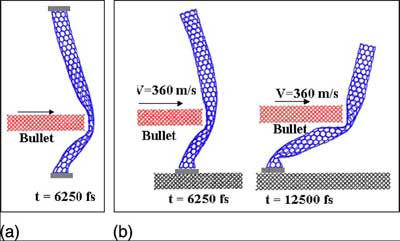| Carbon nanotubes (CNTs) have great potential applications in making ballistic-resistance materials. The remarkable properties of CNTs makes them an ideal candidate for reinforcing polymers and other materials, and could lead to applications such as bullet-proof vests as light as a T-shirt, shields, and explosion-proof blankets. For these applications, thinner, lighter, and flexible materials with superior dynamic mechanical properties are required. A new study by researchers in Australia explores the energy absorption capacity of a single-walled carbon nanotube under a ballistic impact. The result offers a useful guideline for using CNTs as a reinforcing phase of materials to make devices to prevent from ballistic penetration or high speed impact. | |
| Professor Liangchi Zhang from the School of Aerospace, Mechanical and Mechatronic Engineering at the University of Sydney explained the new research to Nanowerk: " Especially in making bullet-proof vests, shields, and explosion proof blankets, the best protective material will have a high level of elastic storage energy that will cause the projectile to bounce off or be deflected, i.e., the objective is to reduce the effects of 'blunt trauma' on the wearer after being struck by a bullet. We therefore tried to understand the impact behavior of CNTs." | |
| Zhang published his recent findings, titled "Energy absorption capacity of carbon nanotubes under ballistic impact", in the September 18, 2006 issue of Applied Physics Letters. | |
Zhang's study analyzes the impact of a bullet on nanotubes of different radii in two extreme cases. For a nanotube with one end fixed, the maximum nanotube enduring bullet speed increases and the energy absorption efficiency decreases with the increase in relative heights at which the bullet strikes; these values are independent of the nanotube radii when the bullet hits at a particular relative height. For a nanotube with both ends fixed, the energy absorption efficiency reaches minimum when the bullet strikes around a relative height of 0.5. |
Blog de cursos y estudiantes de Químicas del Departamento de Ciencias Quimico-Biológicas en la Universidad de las Américas Puebla.
Thursday, December 01, 2011
Carbon nanotubes could make t-shirts bullet proof
Subscribe to:
Post Comments (Atom)
NEODIMIO ¡no te lo pierdas!

-
De entre todos los compuestos químicos que existen, quizá sean los llamados compuestos de coordinación los que mayores dificultades ofrecen ...
-
Básicamente el video habla por sí sólo. Se tiene una cerveza fría líquida recién sacada del refrigerador o congelador, se le da un golpe y e...

No comments:
Post a Comment